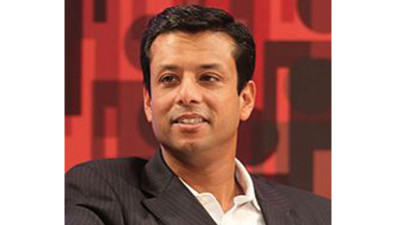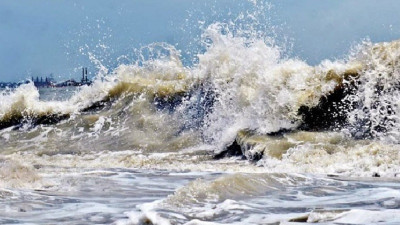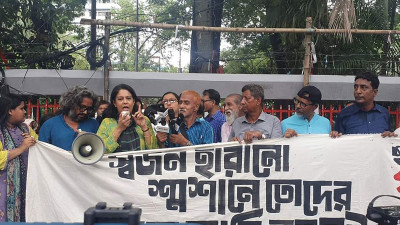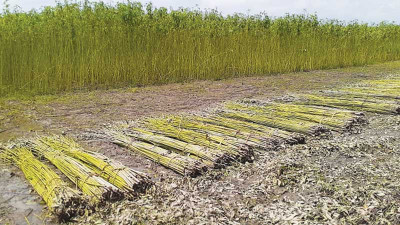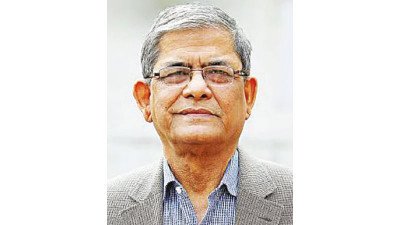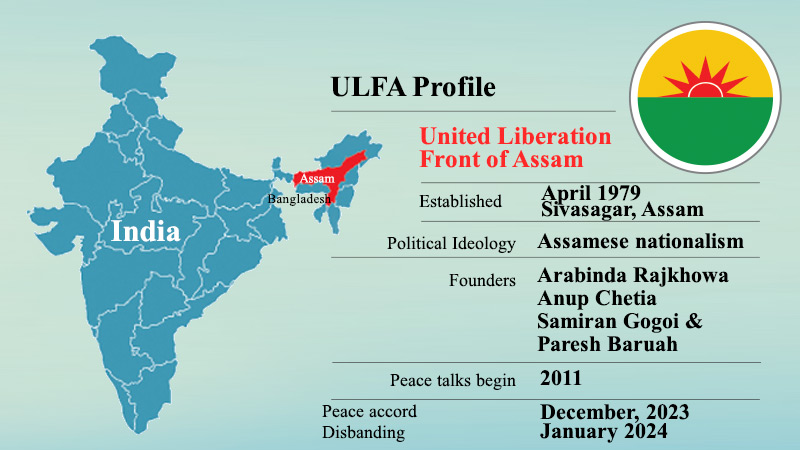 Bonik Barta graph
Bonik Barta graph Around 2009, the government intensified its campaign against
United Liberation Front of Assam (ULFA) and other separatist groups stationed
in Bangladesh territory. Many ULFA top leaders, including its chairman Arabinda
Rajkhowa, were detained by the law enforcing forces of Bangladesh during the drive.
He along with some ULFA top brass were sent back to India around 2010. Upon
return, the ULFA fraction, led by Rajkhowa started negotiations with the
government of India.
Following talks spanning a long 12 years, pro-dialogue segment
of ULFA signed a peace accord with the Indian central government at the end of
December, last year. According to the accord, the members of the rebel group
will refrain from violence, abolish the organization and will be involved in
the democratic process. And, in late January, 2024, the group was disbanded 44
years after the formation.
ULFA had been a headache for the Indian government for decades.
Experts believe that the role Bangladesh played at that time was a powerful
catalyst to push ULFA leaders towards the peace process.
Professor Dr Rafiqul Islam of Dhaka University’s Peace and
Conflict Studies told Bonik Barta, “After being banned by the Indian
government, ULFA went underground to conduct its activities. Their top leaders
were captured in our country. India had long been talking about their presence
in the country. Bangladesh handed them over to India in light of the
extradition treaty signed after capturing them, earlier treaty of friendship
and some other aspects.”
“ULFA became kind of powerless due to this. At the same time,
the organization was split into two. One part wants to negotiate with the
Indian government while the other wants to keep on fighting. In the end, a tripartite
agreement was signed between Indian central government, Assam state government
and ULFA. The group is now talking about peaceful coexistence. Bangladesh has a
huge contribution to this. Due to Bangladesh’s bold stance, ULFA could not
operate from the country,” he added.
According to Bangladesh’s security officials of that time, it
is important to maintain peace and stability in the Indian northeastern states in
the interest of the economy and national security of Bangladesh. Besides, the
development has contributed significantly to the improvement of bilateral
relationship with the neighboring country.
“Not only ULFA, Bangladesh will not allow any separatist
individuals or groups to operate from its territory,” Lieutenant General (retd)
Sheikh Mamun Khaled, former director general of Directorate General of Forces
Intelligence (DGFI), told Bonik Barta.
“As we did not provide shelter, it became easier for the
neighboring country to control the rebel groups. They (India) are very happy
about it. Our constructive role contributed positively to the bilateral ties
between Bangladesh and India. It has opened the door to business opportunity
between Bangladesh and the northeastern states of India,” he added.
It became difficult for ULFA leaders to remain in Bangladesh
after the change of government through national election in 2008. Late Sahara
Khatun became the home minister and present Deputy Speaker Shamsul Haque Tuku
was the state minister for home affairs. The drive against Indian rebel groups,
including ULFA, were conducted under their supervision. Essentially, this ended
ULFA’s ability to operate from outside of India.
When approached, Shamsul Haque Tuku told Bonik Barta, “With
every country, we run our affairs regarding trade, commerce and security based
on ‘friendship to all, malice towards none’ policy. Full credits go to Prime
Minister Sheikh Hasina for whatever we did in 2009. We did what we needed to do
in the context of rule of law and humanity.”
Some opposition politicians also feel that Bangladesh did the
right thing with regard to ULFA. “Bangladesh discourages this kind of activity
out of respect for the neighbor. If we do not do this, India will not be
obliged to send back people arrested in that country. Therefore, I that it was
the right thing to do,” Bangladesh Kalyan Party Chairman Syed Muhammad Ibrahim
told Bonik Barta.
Quite a few senior members of ULFA were arrested in the
clampdown on the organization in 2009. Apart from Rajkhowa, the detained
leaders included Foreign Secretary Sashadhar Choudhury, Finance Secretary
Chitrabon Hazarika and Deputy Commander-in-Chief Raju Baruah. After their
return to India, they were kept in a Guwahati prison. ULFA Vice Chairman Pradip
Gogoi, Publicity Secretary Mithinga Daimary and Cultural Secretary Pranati Deka
were already there. ULFA leaders began the peace negotiations with the central
government from that jail.
These leaders too acknowledged Bangladesh’s role in bringing
the ULFA chapter to an end. Anup Chetia, the general secretary of the outfit,
was sent back to India from Bangladesh in 2015. Upon return to India, he joined
other leaders in peace negotiations. After signing the peace accord, Chetia
told local media, “We could understand that Bangladesh was no longer safe for
us. But, we had nowhere else to go. We were driven out of Bhutan in 2003. Our
leaders were being detained one after another. There was none to give
directions. Leader of our armed wing Paresh Baruah was in another country. Under
the circumstances, we had no other way but to respond to the talks initiated by
the civic organizations of Assam.”
ULFA was established in Sivasagar of Assam in 1979. Rajib
Rajkonwar, later known as Arabinda Rajkhowa, Golap Baruah, known as Anup Chetia
later, Samiran Gogoi and Paresh Baruah were the founders of the outfit. Its
armed activities got intensified at the end of 1980s. Paresh, Rajkhowa and
Chetia became Assam’s three most powerful figures at that time. In 1990s, ULFA
became the biggest security threat for India.
The law and order situation deteriorated drastically at that
time following the killing of manager of a tea garden, Surendra Paul. In
response, the Indian government sent 15 brigades to deal with the situation.
The results of the maneuver called ‘Operation Bajrang’ were not as expected.
One year later, Indian troops began more planned and organized campaign called ‘Operation
Rhino’ against the outfit, inflicting extensive damages to its organizational
structure and operative base.
At that time, rifts started to appear within the ULFA
leadership. A section, led by founding chairman Rajkhowa, wanted to start
discussions with the central government. But, Paresh-led hardliner segment
opposed it. Though the hardliners were able to create influence over the
pro-dialogue section, they could not get rid of the dispute divergence, which
slowly reached an extreme point. As a result, the outfit got split in the
beginning of this century.
Alongside avoiding arrests, the ULFA leaders employed a tactic
to run their activities from other countries. But, the objective to fortify
their positions in neighboring countries was never a success. Due to the strong
position taken by the government formed in 2009, it was not possible for ULFA
to run its operations from Bangladesh. Apart from Paresh Baruah, almost all the
top ULFA leaders were captured in Bangladesh to be sent back to India later.
Assam’s Chief Minister Himanta Biswa Sarma expressed his gratitude
acknowledging the role played by Bangladesh at that time. During a courtesy
meeting with then Bangladesh Foreign Minister Dr AK Abdul Momen in May, 2022,
Sarma voiced his gratefulness.
Commenting on this, Dr Momen told Bonik Barta, “During our
meeting in May, 2022, the Assamese chief minister told me we have everything.
Due to fear of terrorism, investors did not invest here for a long time. But,
when your Prime Minister Sheikh Hasina said Bangladesh will have zero tolerance
to terrorism and Bangladesh will not be a hub for terrorist activity. After
that the fear of terrorism decreased significantly. As a result, investment in
the state increased considerably. We are grateful to Sheikh Hasina.”
The immediate-past foreign minister also said, “Due to
Bangladesh’s role, India does not have to worry about its eastern borders. They
do not have to spend billions of dollars.”
After Bangladesh sent back the ULFA leaders to India, the fraction
led by Rajkhowa started talking to the central government and state government.
At that time, Paresh Baruah tried to replace Chairman Rajkhowa with Abhijit
Barman. This made the divisions within the group even worse. And, ULFA’s
influence all over Assam started to diminish and the organization became
weaker.
About the role of Bangladesh in leading the outfit to peace,
former Ambassador to the United States Humayun Kabir told Bonik Barta, “I think
the government’s decision not to provide shelter to northeastern rebels was a
right one. This has strengthened mutual cooperation and confidence between the
two countries.”
However, experts on politics
and security are not fully comfortable with the signing of the peace accord. The
most radical faction led by Paresh Baruah is still opposed to the peace process.
These hardliners have yet to announce any ceasefire or participation in the
peace process. Therefore, there is still little doubt about the full closure of
the ULFA chapter.



